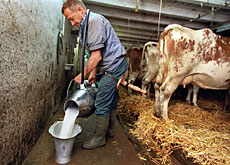
Swiss dairy farmers milk high global demand

Price increases for dairy products in Europe and a worldwide shortage of milk powder and butter are giving an unexpected boost to some Swiss farmers.
It has also prompted calls for higher milk prices for dairy farmers producing mainly for the domestic market and renewed pressure on the agriculture sector amid moves towards liberalising global trade.
The price of low-fat milk powder has more than doubled on international markets since the beginning of the year, creating an unusual situation for Swiss dairy farmers.
A ton of milk powder is currently worth up to SFr6,000 ($5,000) internationally, while Swiss prices have remained stable at SFr4,500.
This allows Swiss producers of low-fat milk powder – used in chocolate or for ice cream – to make a healthy profit, since they also benefit from a state subsidy of SFr770 per ton.
“For the first time Swiss farmers are milking their cows for competitive prices,” is how the Sunday edition of the Neue Zürcher Zeitung newspaper put it.
In the past most Swiss farmers struggled to keep up with their counterparts in neighbouring European Union countries and depended on subsidies and other state pay-outs.
What is worse for many farmers is that there has been political pressure to scrap subsidies as part of parliament’s drive to liberalise the agricultural sector and adapt to global markets.
Price up
Meanwhile, producers of fresh milk are still feeling the squeeze.
The Association of Swiss Milk Producers has called for a staggered increase of seven centimes per kilogram of milk by the end of the year.
“Demand is high, supply is low and farmers have a low income,” the association’s president Albert Rösti told Swiss television on Tuesday.
Milk prices in the EU – of which Switzerland is not a member – are expected to rise by up to 20 per cent this year and are having an impact on the Swiss dairy market.
“A higher price for fresh milk is justified to avoid putting farmers at a disadvantage against low-fat diary producers,” the milk producers said on Tuesday.
The association is confident that it will find a solution in negotiations with the dairy and retail industries, association deputy director Stefan Hagenbuch told swissinfo.
The federal authorities have only limited means to influence the markets, according to Andreas Galler of the Federal Agriculture Office.
As of September 2007, subsidies for low-fat milk powder will be suspended. Export subsidies will be scrapped from the end of next year as part of revised legislation.
Galler is not surprised by the latest demands.
“It’s understandable that in the current situation milk producers are calling for higher prices,” he said.
EU free trade
It remains unclear what impact the current prices will have on exploratory talks between Bern and Brussels on a free trade accord on agriculture.
Galler says the more favourable position of Swiss farmers could potentially make it easier to find support for a deal.
But the rightwing Swiss People’s Party, which claims to represent farmers’ interests, is sticking to its position.
“The free trade accord with Brussels remains a taboo for us, because open markets will put Swiss farmers in a very difficult position,” spokesman Roman Jäggi said.
This highlights the temporary nature of the dairy price boom, says the Farmers Association.
“The gap between some Swiss farmers and those in the EU might have narrowed as a result of the high price, but it won’t solve the fundamental problems,” said its spokesman Urs Schneider.
He added that negotiations within the World Trade Organization had wider ramifications for the industry than a possible EU deal.
swissinfo, Urs Geiser
Switzerland’s 27,000 milk farmers are among the 60,000 farmers to receive direct payments from the state.
In June parliament decided to gradually open up the agriculture market by scrapping subsidies – although at a slower pace than the government had planned.
Talks within the World Trade Organization (WTO) are currently stalled over the liberalisation of agriculture.
Experts say growing demand for dairy products, notably in Russia, Asia – mainly China – and Latin America, is one of the reasons for the shortage.
Other reasons are the EU’s agricultural policy aimed at limiting milk production in member countries as well as a serious drop in milk exports from Australia as a result of heat waves.
Argentina has increased export tariffs and India has stopped exports of milk powder.
Another factor is that the high demand for rapeseed and wheat production has prompted farmers to reduce milk production.

In compliance with the JTI standards
More: SWI swissinfo.ch certified by the Journalism Trust Initiative






























You can find an overview of ongoing debates with our journalists here . Please join us!
If you want to start a conversation about a topic raised in this article or want to report factual errors, email us at english@swissinfo.ch.